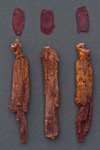| Scientific: | Panax ginseng |
|---|---|
| Other: | Asian Ginseng |
| Family: | Araliaceae |
Asian ginseng or Korean ginseng has been used in eastern medicine for thousands of years as a panacea " cure-all " to treat a wide variety of illness. The root is primariy used and is usually grown for at least 4 years before harvested. White ginseng is obtained from drying the fresh root. Red ginseng formed by steaming the roots before drying them. The steaming process modifies the chemical composition making certain constiuents more bioavailable, active and more desirable. Korean ginseng is one of the most important herbal supplements in Asia and one of the worlds most expensive herbs and the cost increases with the age of the plants.
It is generally used short term in healthy people as an adaptogen to help decrease the negative effects of stress and increase stamina. research shows it acts as a nootropic to improve mental function like concentration and stamina.
Highly regarded herb in Asian medicine. Strongly tonifies qi and nourishes yang. More stimulating and warming than Panax quinquefolius. One of the most stimulating adaptogens.
Endocrine
• stress
• adrenal fatigue
• chronic fatigue syndrome (CFS)
• diabetes mellitus type 2
• hypoglycemia
• hypothyroidism
• pancreatitis
• fibromyalgia
Reproduction
• sexual dysfunction
• erectile dysfunction (ED)
• infertility
Nervous
• poor cognition
• memory
• attention deficit hyperactivity disorder (ADHD, ADD)
• mood disturbances
• depression
• anxiety
• neurodegenerative disorders
• dementia
• Parkinson's disease
• Alzheimer's disease
• drug withdrawal
• smoking cessation
• alcohol abuse
Immune
• chemotherapy and radiation side-effects
• fatigue
• immunosuppresion (leukopenia, neutropenia)
• allergies
Note: Research suggest that it can significantly increase survival rates in cancer patients.
Gastrointestinal
• tonifies spleen & stomach in TCM to improve
• dyspepsia
• bloating
• diarrhea
• gastric ulcers
• pancreatitis
• halitosis
Cardiovascular
• Raynaud's
• intermittent claudication
• arrhythmia
• angina pectoris
• hyperlipidemia
• Adaptogen
• Immunomodulator
• Tonic
• Stimulant
• Sedative
• Male Tonic
• Sexual Tonic
• Anticancer
• Nootropic
• Cardiotonic
• Cardioprotective
• Hepatoprotective
• Antiarrhythmic
• Hypoglycemic
• Antihyperlipidemic
• Antiulcerogenic
• Antiinflammatory
• Antiaging
• Terpenoids
• Steroidal Glycosides (Ginsenosides )
None included.
• Tincture (1:5 in 60% EtOH): 1-2 ml tid
• Decoction (dried powdered root): 0.5-1 tsp tid
Contraindications: Acute infection.
Side effects: Increased blood pressure.
Caution: Use with anticoagulants (e.g. coumadin); may potentiate effects. Hypertensive patients; monitor BP.
Pregnancy and lactation: Korean ginseng deemed safe.
• High doses: may cause aggitation, insomnia, diarrhea, skin lesions
• Cardiac glycosides • potential for interaction
• Anticoagulants (e.g. coumadin) • known to interaction
• MAO inhibitors • suspected to interact
• Stimulants • may potentiate them
• Drug metabolism • known to inhibit specific P450 (CYP1A1, CYP1A2, CYP1B1)
• Oral hypoglycemics • may potentiate them because ginseng decrease blood sugar
Barnes J, Anderson LA, Phillipson JD. Herbal Medicines, 3rd ed. London: Pharmaceutical Press, 2007.
Bone K. Principles and Practice of Phytotherapy. Edinburgh: Churchill Livingstone, 2000.
Bone K. A Clinical Guide to Blending Liquid Herbs: Herbal Formulations for the Individual Patient. St Louis, MO: Churchill Livingstone, 2003.
Brinker F. The Toxicology of Botanical Medicines, 3rd ed. Sandy, Oregon: Eclectic Medical Publications, 2000.
Felter HW, Lloyd JU. King's American Dispensatory. 1898. http://www.ibiblio.org/herbmed/eclectic/kings/main.html. Accessed: August 19, 2006.
Hoffman D. Medical Herbalism. Rochester, Vermont: Healing Arts Press, 2003.
Weiss RF. Herbal Medicine. Beaconsfield, England: Beaconsfield Publishers Ltd, 1988.
Williamson EM, ed. Major Herbs of Ayurveda. Edinburgh: Churchill Livingstone, 2002
Disclaimer: This content is subject to change. The information is intended to inform and educate; it does not replace the medical evaluation, advice, diagnosis or treatment by a healthcare professional. www.nhpassist.com © 2014 NDAssist Inc. and/or its affiliates. All rights reserved.

|
Asian Ginseng
SummaryAsian ginseng or Korean ginseng has been used in eastern medicine for thousands of years as a panacea " cure-all " to treat a wide variety of illness. The root is primariy used and is usually grown for at least 4 years before harvested. White ginseng is obtained from drying the fresh root. Red ginseng formed by steaming the roots before drying them. The steaming process modifies the chemical composition making certain constiuents more bioavailable, active and more desirable. Korean ginseng is one of the most important herbal supplements in Asia and one of the worlds most expensive herbs and the cost increases with the age of the plants. IndicationsSign in requiredActionsSign in requiredConstituentsSign in requiredPharmacologySign in requiredPosologySign in requiredSafetySign in requiredInteractionsSign in requiredReferencesSign in required |
|---|